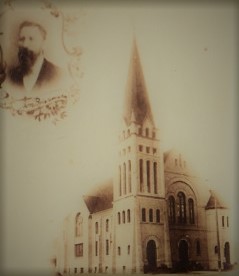
The church in Winnipeg was built in 1904 and lasted until 1921. Reverend Jón Bjarnason was then the pastor of the congregation, and he held that office until his death in 1914. Photo: FLK
Steingrímur grew up in the Garðar settlement in N. Dakota, and although the settlers competed to break the land, build their houses, there was still time to take care of children and their studies. There are no stories of the pioneers owning many musical instruments in the new settlement in N. Dakota, but that did not prevent singing in a young children’s school in the Garðar settlement. Little Steingrímur probably had to suffice with singing for a while, but the years passed and when he was 19, it was clear where his mind was headed. He was obviously gifted with good musical talent, so good that it was thought right to send him to the music department of Gustavus Adolphus University in St. Peter, Minnesota. From there he completed his B.A. degree in 1899 and continued on for the next three years at the Minneapolis and Chicago Musical Colleges. During these years, he had time to rush to Winnipeg to marry Sigríður Anna Hördal, a singer. He was hired as a teacher in the music department of Gustavus Adolphus in 1902, where he taught piano and organ until 1905. That year he was hired as a teacher at St. John’s College in Winnipeg where he taught piano. He was hired as an organist at the First Lutheran Church in Winnipeg in 1907 and held that position until 1935. Steingrímur took an active part in the musical scene in Canada and appeared in many places. He was a founding member of the Manitoba Music Teachers Association and a member for several years of The Imperial Academy of Music. He performed public piano solos to great acclaim and was praised by music critics for his music. He was an honorary member of The Icelandic Canadian Club. There is much left by him and we can mention Icelandic Song Miniatures with English translations, Toronto, 1924; Songs of Iceland with English Texts, Toronto, 1936; Songs of the North with English Texts, 1954 and My God, why hast thou forsaken me, Winnipeg, 1924. He gave the University of Manitoba in 1954 one of 40 volumes of Icelandic compositions, including his unpublished musical manuscripts, in memory of his wife.
Þórstína Þorleifsdóttir wrote in her book “Saga Íslendinga in N. Dakota” and said of him:
“In the more than twenty years that Steingrímur and Sigríður have been married, they have combined their efforts to make the most of their musical talents. Steingrímur Hall has been the organist of the First Lutheran Church in Winnipeg and conducted the choir there for several years. His wife has been regularly singing there. They have also traveled through the various Icelandic communities and thus given their countrymen the opportunity to hear their talent. Both of them have understood that art is a master who demands that those who practice it do not slack off if success is to be achieved and progress is desired. Despite her household chores, Sigríður has maintained what she learned and added a wider knowledge in her art. Recently, she was studying in the city of New York with a teacher who is considered one of the most famous in America, and he highly praised her singing voice and her understanding of how to weave herself with life and soul into the material of what she sings. She has made a point to sing Icelandic songs among local people and received much praise. Significant musicologists are of the opinion that Sigríður Hall had a natural talent that could have made her a star in this country’s operas, such as the Metropolitan in New York, but her destiny has been to work mostly among Icelanders and make them happy and comfort them with their beautiful songs, and prove to be a good wife and mother, and a true asset in Icelandic society. When all is said and done, it is uncertain which life path is more preferable. Steingrímur is not only known as a genius on the forte-piano and organ, but he has also dedicated himself to composing original songs. This includes the song “Þótt þú langförull legðir”, and another song with the Passion Psalm verse “Vertu guð faðir faðir minn”. He recently published a collection of original songs with English lyrics, translated from Icelandic, and they contain many gems of Icelandic poetry. This volume is called ”Icelandic Song Miniatures” and was published in Chicago. In his songs, he leans towards classical music, and his songs are popular, melodious and emotionally balanced. Apart from original songs, Steingrímur has also helped with the printing of various music books, such as the Songbook of Icelandic Leagues. He has also achieved much in his work as a teacher. In demeanor, Steingrímur Hall is the most genteel man, cautious and fair-minded in his judgments. He is a well-read man and is interested in all necessary advancements.”
English version by Thor group.
